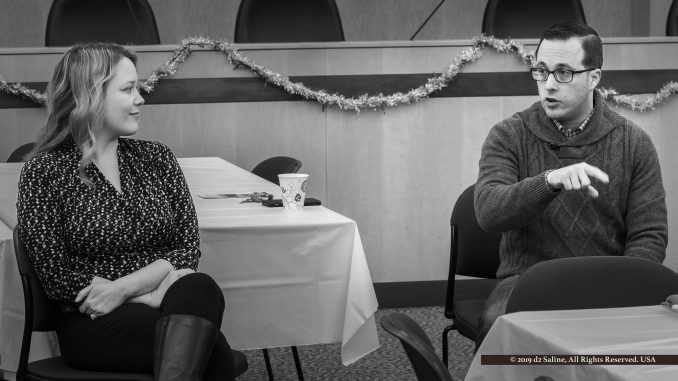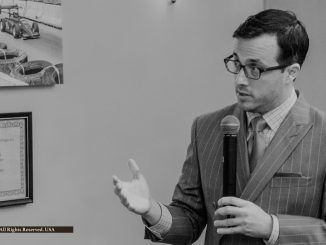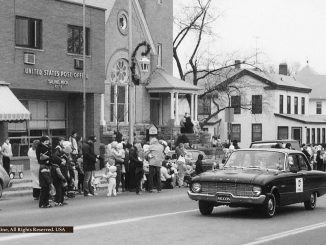
As the last Coffee Hour of 2019, the discussions that came over the course of ninety minutes inside City Council Chambers this morning had more of a “highlights real” feel than seems common in other months, other places.
This get-together was hosted by our Mayor, Brian Marl, joined by Shannon Beeman, Washtenaw County Commissioner for District 3, as had been previously announced. His brief introduction of her was effusive, with pointed emphasis of the value that Ms Beeman brings to her first year in this position through extensive enterprise development experience through associations with Ann Arbor SPARK and the University of Michigan. [1-6]
Not surprisingly, this was a deeply local (if not hyperlocal) coffee hour. It was also interesting to see this setting re-cast with elected officials and members of the general public seated about tables on the same level.
Early on, former Council Member David Rhoads was recognized for an update on the “Leslee Neithammer Saline River Preserve” — named in memory of his late wife and former director of Saline District Library. [7,8]
He went on to discuss progress made on clearing obstructions from the river flowing from Curtiss Park to Milan, four of twenty-three miles completed thus far. Mr Rhoads also made a pitch for development of non-motorized routes within city limits.
Tangentially, Mayor Marl voiced general frustration at the lack of county support for park inititives in Saline, noting that this has not for a long time been anything near on par with our financial contributions. He then alluded to steps being taken to change that, including advocacy for formal placement of a Saline representative among decision-makers. [9]
Commissioner Beeman spoke broadly about transportation initiatives involving Oakland and Wayne Counties. “This isn’t about a train from Ann Arbor to Detroit,” she noted. “It’s about what we can do to help people who don’t have access to transportation, and people who don’t drive.” [10]
The first of what would be two extended, animated exchanges that involved the both officials and a number of audience members centered on perceived lack of accountability by the Washtenaw County Road Commission. Individuals complained about increasingly excessive investment in roundabouts, the unjustified impact of such constructions on surrounding green space, and consequent effect of siphoning funds from other more imperative needs elsewhere. There was talk, too, of excessive chemical use. [11]
Both the Commissioner and Mayor empathized; Mayor Marl went on to provide a bit of context in terms of distinguishing city versus county responsibilities.
Expanding on this, he observed that our area is experiencing “a crisis in skilled labor. [12]
The City recently sent out RFPs for two road projects, and we didn’t receive a single bid. I discussed this with one of our past contractors and he told me it was going to cost a lot more than we were expecting — but no one could do it. They don’t have time or labor.
I know I’m not going to be very popular for saying this, but that’s a weakness with our educational system. They’re not putting enough emphasis on skilled trades, on advocating this as a valuable, important, respectable career path.
And, perhaps I’m saying this selfishly — but not selfishly on my own behalf, but on behalf of the city — our infrastructure is suffering because of this. That’s just a fact.
Mayor Brian Marl also spent a bit of time discussing progress on complex negotiations with developers behind the Andelina Farms subdivision off the Westgate of Saline. Copies of an 11-page Settlement Agreement signed by both Saline Ventures and M/I Homes of Michigan, and the City of Saline were made available in substantiation of assertions by the Mayor that “We are close to resolution on this.” [13,14]
The topic also sparked a second round of animated discussions on the subject of City Council Members stepping off the public record to meet with attorneys in executive session. Saline Journal readers will recall that it was an issue raised by a former Saline mayor from the 1980s, The Honorable Donald E Shelton. [15]
I think the Executive Sessions and decisions made in these have to be kept to a bare minimum. The whole idea of FOIA is that these decisions will eventually be made public — whether contracts or real estate purchases.
There in Saline City Council Chambers on Washtenaw County Commissioner Shannon Beeman spoke this morning in favor of appropriate confidential dialogues involving elected officials and legal council. “Ann Arbor is dealing with dioxane polution from Gelman Sciences, and they’re in litigation. It’s not a problem for Saline — thankfully.
Frankly, I don’t want Gelman to know what our legal strategy will be. If you hold discussions with your attorney in public session, their attorneys just hit rewind on the tape and they’ll always be ahead of you. Just like that. And =that’s not fair to the people who elected you.
It’s a balance. But your elected officials are still accountable to you, they’re always accountable to you. Because if you think they are abusing this, you can vote them out of office.
Mayor Marl closed this Coffee Hour by noting that this event itself, here, today, might rightly be viewed as raising the bar on officials’ accountability for their judgment in use of executive sessions. “I will agree that we had a lot of executive sessions over Andelina Farms. I don’t know if I’d say, ‘too many,’ because those sessions wouldn’t have taken place if Council Members hadn’t voted for them, and they did.
But say that Andelina Farms was a lot. If that’s true, then I think it’s the exception. I think you’d have to look really hard to think of another example. I think you’d have to look back quite a ways.
I’ll also say this: Since I’ve been your mayor, I think I’ve held more public forums like this than any of my predecessors. Part of the reason I do that is because I want to be held accountable, I want to come out to the public and be asked any question in a forum like this and answer to the people who elected me.
Although this gathering might have been considered a bit lighter than average, it was surely typical in the sense that none of the topics raised was shut down or given short shrift. Neither were passions stifled. Thus a good feel for highlighted community interests as they stand in the waning days of 2019 was largely able to be discerned.
References
- “Shannon Beeman” University of Michigan, Zell Lurie Institute.
- “Shannon Beeeman (D)” Board of Commissioners, Washtenaw County Michigan.
- Board of Commissioners, Washtenaw County Michigan (home page).
- “District 3 Map” Washtenaw County Board of Commissioners.
- Ann Arbor SPARK (home page).
- “Phil Santer on tech in Saline: A lot more innovation is happening than you may realize” Phil Santer (May 21, 2019) Saline Journal.
- “Leslee Neithammer Saline River Preserve” Visit Saline.
- Saline District Library (home page).
- “Saline’s Parks” Saline.
- “Wayne, Washtenaw, Oakland county leaders seek regional transit expansion, Macomb sits out” Omar Abdel-Baqui and Kathleen Gray (November 18, 2019) Detroit Free Press.
- Washtenaw County Roads Commission (home page).
- “‘Everybody Isn’t Cut Out for Trade Work,’ Advises Dr Rose Bellanca, Washtenaw Community College President” Dell Deaton (May 21, 2018) Saline Journal.
- “City or Township? It’s been a long, bumpy road to new homes near Saline” Sheila Beachum Bilby (December 2017) Ann Arbor Observer.
- “Saline’s leaders explore complex challenges of expansion on city’s west side” Jack Ritchey (August 23, 2019) Spartan News Room.
- “A perspective on past service as part of Saline City Council, Part 3 of 3: Our discussion with former mayor Donald E Shelton” Dell Deaton (October 25, 2019) Saline Journal.
- “History of the Pall-Gelman Dioxane Groundwater Contamination Cleanup” Lynn Monson, The Ann Arbor News.
- “Gelman Sciences, Inc Site of Contamination Information Page” EGLE: Michigan Department of Environment, Great Lakes, and Energy.
- “Officials to discuss next steps for Ann Arbor dioxane plume tonight” Ryan Stanton (December 12, 2019) mLive.



